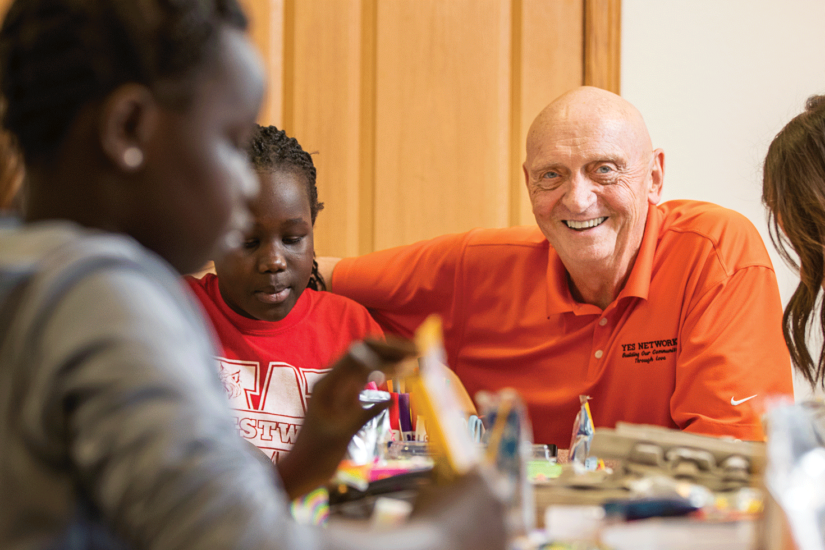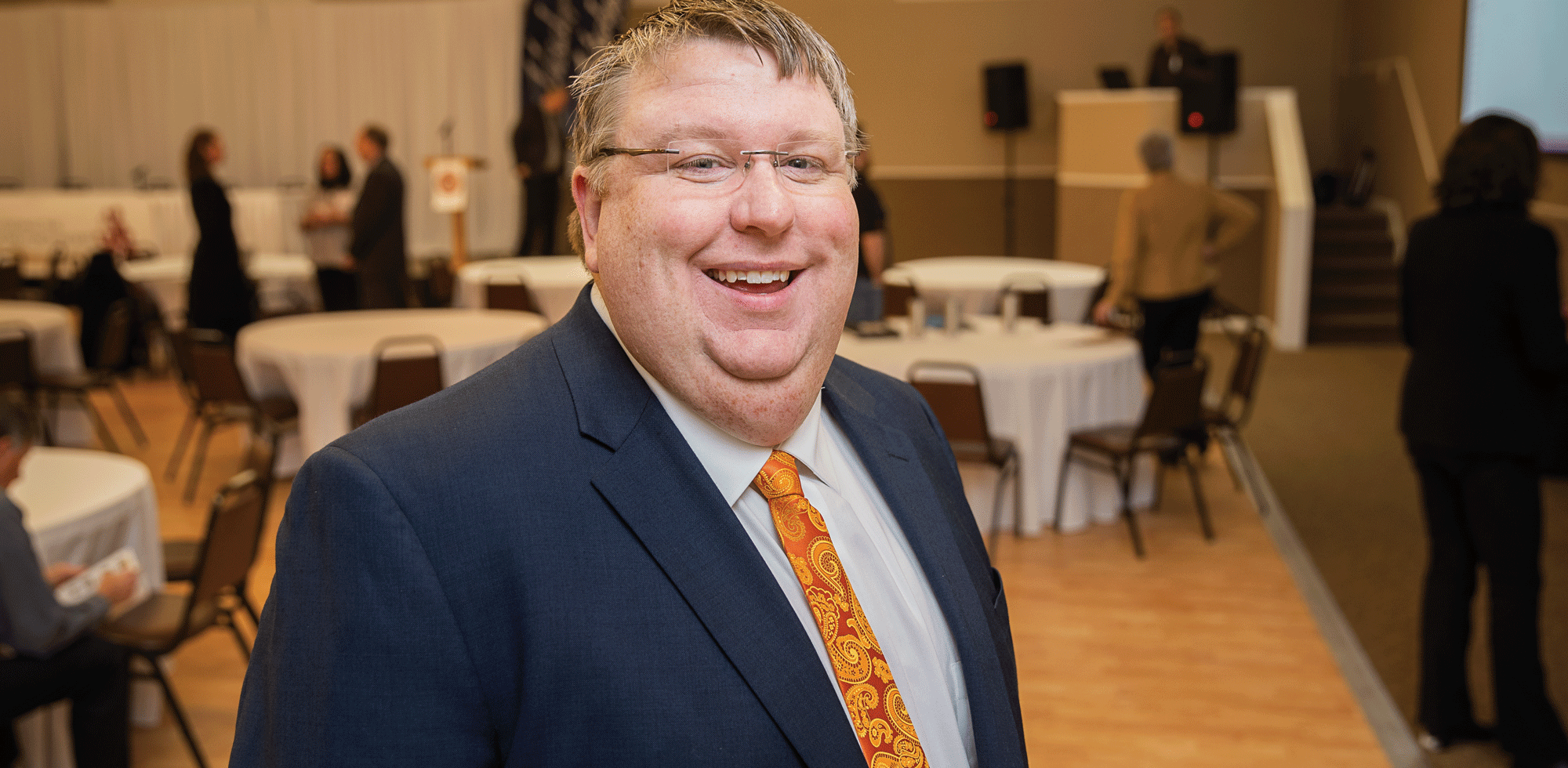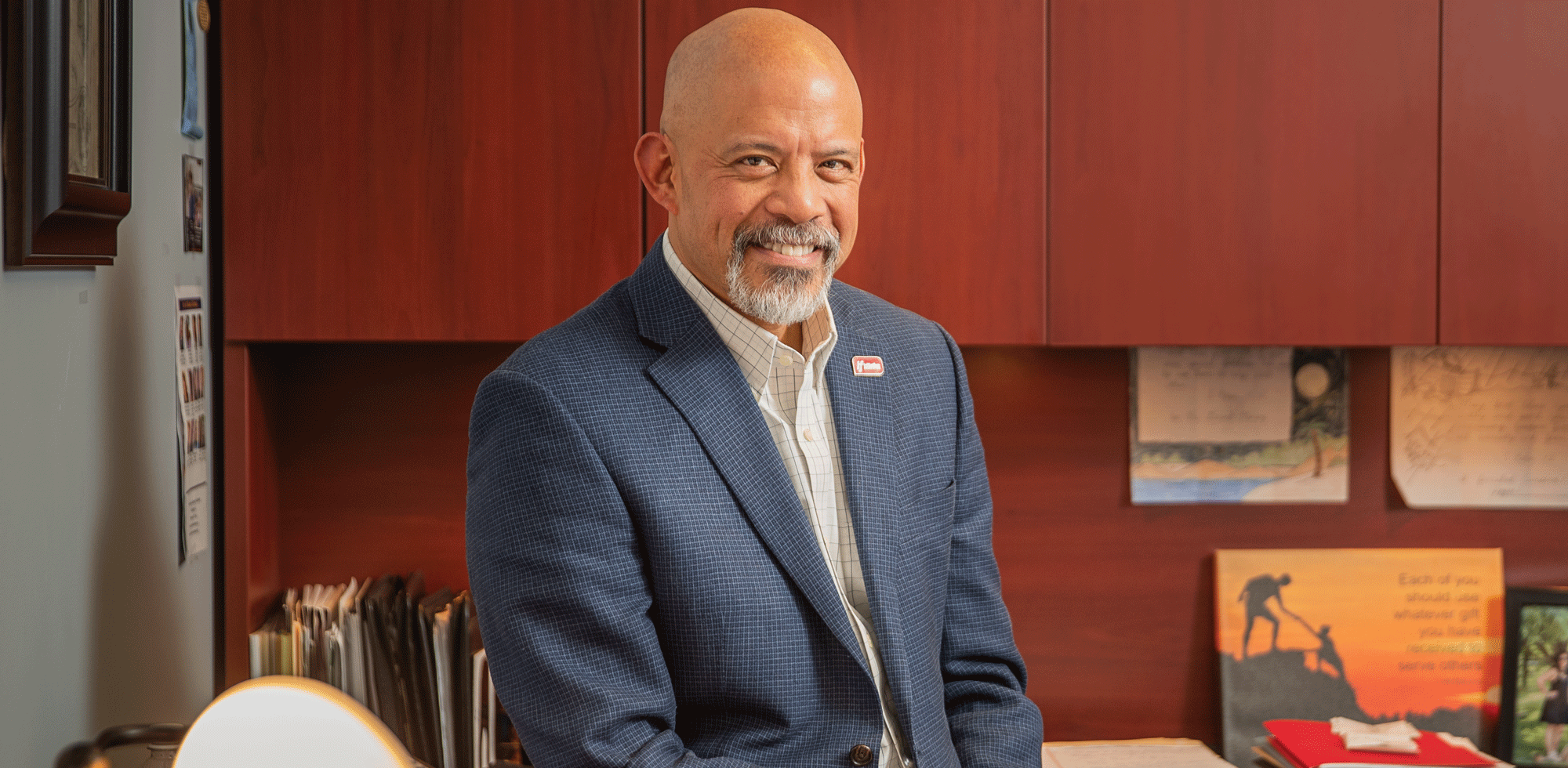
Bridge Builders
It’s not always the public figures who are the change makers. Meet the behind-the-scenes leaders who are creating fruitful social and economic connections in Central Minnesota.
By Gene Rebeck | Photography by John Linn
A bridge is easy to overlook. People, after all, often focus on their destination, not the structure that enables them to get there. But communities without bridges don’t have the pathways they need to survive and thrive.
The three leaders profiled here build the links that strengthen the human and economic bonds in their hometowns—and beyond. Their stories also inspire others to help build still more bridges—connections that bring the residents of their neighborhoods, cities and regions closer together.
“Each of these community leaders shares a couple of key traits,” said Matt Varilek, president of the Initiative Foundation. First, they’re great at building relationships and connecting members of their networks who have potential for fruitful collaboration. And second, they prefer not to call attention to themselves. Their focus is on making their communities better.”
Community Bridge-Builder: JERRY SPARBY
On September 24, 2003, a freshman at Rocori High School in Cold Spring shot and killed two of his fellow students. For Jerry Sparby, whose career as a teacher, principal and athletic coach in the Cold Spring elementary school system spanned more than three decades, the shooting was not just a shock.
“It was a wake-up call,” Sparby said of his sudden realization that there were troubled people in what he’d thought was “the perfect world in Cold Spring.”
The trauma of that September day would lead Sparby to look for ways to change the culture of the schools. “I realized it was really about changing or developing a culture in the neighborhoods,” he said. “Many residents feel disconnected from their hometowns and from their fellow citizens. That’s particularly true of young people, whether they come from poorer communities or from more middle-class areas.”
While troubled young people might be connected to the online world, Sparby thinks they are becoming more and more alienated from real life. “They communicate with their devices, but they don’t talk,” Sparby said. “They don’t talk to each other, they don’t talk to their parents, they don’t talk to their teachers. I’ve had kids tell me they haven’t talked to their parents in over a year. It’s a world we’ve created.”
And it’s a world Sparby is working to change through the Yes Network, the St. Cloud-based nonprofit he founded in 2012. Yes Network grew out of Sparby’s work as an educator and a family therapist; it started out providing food to Cold Spring and St. Cloud neighborhoods in need. But in getting volunteers to deliver the food, Sparby discovered that the mutual engagement was an added benefit.
As Sparby learned more about what communities needed, he adjusted his approach. He hired parents to make the deliveries. As he listened to neighborhood residents, Sparby came to realize that “it wasn’t the parents that were going to change the culture of the neighborhood—it’s the kids,” he recalled. He also understood that “kids relate to kids better than to older people.” That led him to hiring high school kids to deliver meals during the summer.
Over the years, the Yes Network model has continued to evolve based on neighborhood needs. In addition to food delivery, employees and volunteers provide neighborhood enrichment activities, such as barbecues and other gatherings, that bring neighbors together in a spirit of fun. Yes Network also offers arts and recreation programs for young people, and mentoring for its young employees.
Sparby isn’t doing all this on his own, of course. Among his many partners is the Initiative Foundation, which has provided financial support. The Foundation has also connected Sparby with AmeriCorps VISTA service members.
“I appreciate Jerry for a lot of reasons, and especially for the model for his work,” said Amanda Whittemore, the Initiative Foundation’s VISTA and nonprofit development
program manager. “He does the difficult work of connecting to and deeply understanding the communities’ identified needs rather than deciding what he thinks might be best for them. That really requires a lot of skill, energy and intent.”
Once the needs are identified, she added, “Jerry works tirelessly to leverage people and network resources. In particular, he engages those community members in developing solutions so that they feel like they’re part of the work.” Whittemore believes that approach makes Yes Network’s work more sustainable.
During the past few years, Sparby has been working with other cities to expand Yes Network. Three years ago, two churches in Sauk Rapids contacted him to start a program. Meanwhile, parents and organizations in other cities in the region also have gotten in touch.
Sparby emphasized that the Yes Network model can be customized from city to city, neighborhood to neighborhood, based on what residents need and desire. “We have a template, but it’s pretty flexible,” he said. No matter how it’s used, the basic idea remains the same: to feed our kids living in poverty and to build loving relationships through play, activity and human connections.
Visit yesnetworkmn.org to learn more and to support the program’s outreach efforts.

Economic Champion: Jordan Zeller
Need a connection to a state financing program? The phone number of a consulate who could help a local manufacturer make an international sale? An expert who can advise your city about entrepreneurship programs?
Chances are, Jordan Zeller can make that happen.
“It seems like any time you need a contact for just about anything, Jordan can pull it off his phone,” said Nancy Hoffman, executive director of the North Branch-based Chisago County Housing and Redevelopment Authority and Economic Development Authority. In addition to being a great resource, Hoffman described Zeller as someone who offers to help wherever he can, whatever the project is. Though he’ll lead when asked, Zeller is typically “the person in the background who gets the work done.”
That’s the way Zeller likes it. As economic development planner for the Mora-based East Central Regional Development Commission (ECRDC), Zeller is involved in numerous initiatives and programs. But he prefers to let others take the credit, finding ways to connect programs with partners that can help move them forward.
One of the projects Zeller is currently focused on is helping area schools create programs that expose young people to the types of technical skills that area companies need to compete and grow. “At least in our region, there’s a big disconnect between what students are learning and what businesses are looking for,” Zeller said.
Last year, Zeller and the ECRDC brought together representatives from area schools and economic development organizations, along with elected officials, to expose them to approaches that schools in other regions are using to align their educational offerings with local employer needs. ECRDC staff led a tour of the TigerPath Academies in Hutchinson, where they’ve realigned the electives offered at Hutchinson High School on four different tracks, including STEM. For another tour, Zeller took regional educators and leaders to Strum, Wis., where the school district has launched an in-school manufacturing business.
“We’re not saying these approaches will work in your school or are what your community needs,” Zeller said. “But it could spur some new ideas.” In addition, “we’re trying to mirror what kinds of jobs are out there today, and we’re trying to look ahead 10, 15 and 20 years. What kinds of skill sets are these students going to need?”
Zeller and his colleagues hope to inspire schools in the five counties served by GPS 45:93, an economic development consortium located on Interstate 35 between Minneapolis and Duluth, to craft skills development programs in partnership with local businesses. The Initiative Foundation will help by offering $2,500 challenge grants to one high school in each of the five counties served by GPS 45:93.
At the same time, Zeller is working on several other East Central Regional Development initiatives, including broadband, housing and transportation. He also has lent a hand to other organizations needing his expertise. Case in point: Zeller has helped train new hires at the Staples-based Region Five Development Commission (R5DC) on comprehensive planning services. “Jordan has not only trained our employees,” said Cheryal Lee Hills, R5DC executive director. “People he has trained in community development also are working for private sector employers and other units of government.”
For Zeller, the work he does for his organization and others illustrates the importance of working together—“our cities, our counties, our economic development organizations, and what I like to call the key strategic partners, like the folks at the Initiative Foundation,” he said. “The problems and the projects are big enough that one person or one organization can’t do it all. It has to be a collaborative effort. And that’s where we tap the Rolodex and bring folks together.”

Friend of Philanthropy: DAVID MONROY
Every February, the Elk River Area Chamber of Commerce sponsors Shiver Elk River, an outdoor event that celebrates winter with food, outdoor games and other activities. One of the event’s highlights is a plunge into frozen Lake Orono. Hardy participants, backed by pledges, raise money for area nonprofits.
In 2017, during his first year as the chamber’s board chair, local attorney David Monroy volunteered to go first. “I also volunteered my family to join me,” Monroy recalled, with a hearty, joyful laugh that colleagues says is a personal trademark. “They weren’t as enthusiastic as I was about it. But they did it!”
Once you discover that Monroy was born and raised in Hawaii, his plunge into those icy waters becomes even more impressive, as does the fact that Monroy estimates that over the years the plunge has raised $100,000-plus for local nonprofits.
Besides his full-time work as the owner of Monroy Law Office in Elk River, Monroy is the past president of the Three Rivers Community Foundation, on whose board he has served for six years. He also is active on the boards of other nonprofits and several area businesses, including the Initiative Foundation’s Board of Trustees, and provides legal advice to organizations including the Hilltop Regional Kitchen in Eagle Bend, which serves meals to those in need in Todd and Wadena counties.
In 2006, Monroy, his wife, Rohnda, and their three children left Hawaii and moved to Elk River to answer a ministry calling for community and economic development mission work. As an attorney, Monroy provides legal guidance for nonprofit organizations and churches, on issues that include reviewing bylaws, board expansion and an organization’s status as a charitable organization that can receive tax-deductible charitable donations.
But it’s not only his legal expertise that has made Monroy a valued board member. “Because of his experience outside of Elk River, he brings a broad perspective to any situation,” said Debbi Rydberg, executive director of the Elk River Area Chamber of Commerce. “He’s also a champion and cheerleader for almost any project. He doesn’t just serve and then leave.”
Monroy’s technical skills are only enhanced by his easygoing personality. “He knows when to lighten the mood,” Rydberg said. What’s more, “he’s very generous with his appreciation of everyone’s strengths,” and has a knack for weaving together the often-disparate skills and insights of board members.
When he’s asked to join a board, which seems to be often, “it’s hard sometimes to say no,” Monroy said. “I do have to be a good steward of my time, so I do try to prayerfully pick and choose.” He chose the Three Rivers Community Foundation board because “it offers grants to area nonprofits as well as scholarships through the school district. I serve on one organization, but I can have broad-based impact throughout the community,” he said.
Still, Monroy continues to battle the temptation to plunge into other commitments. Last December, before he was to address the inaugural class of the Initiative Foundation’s Initiators Fellowship program for social entrepreneurs,
Monroy was introduced by Jeff Wig, the Initiative Foundation’s vice president for entrepreneurship, as “a serial board member.” Monroy laughed at the memory. “So many causes are so good,” he said. “And it’s always humbling to even be asked.”